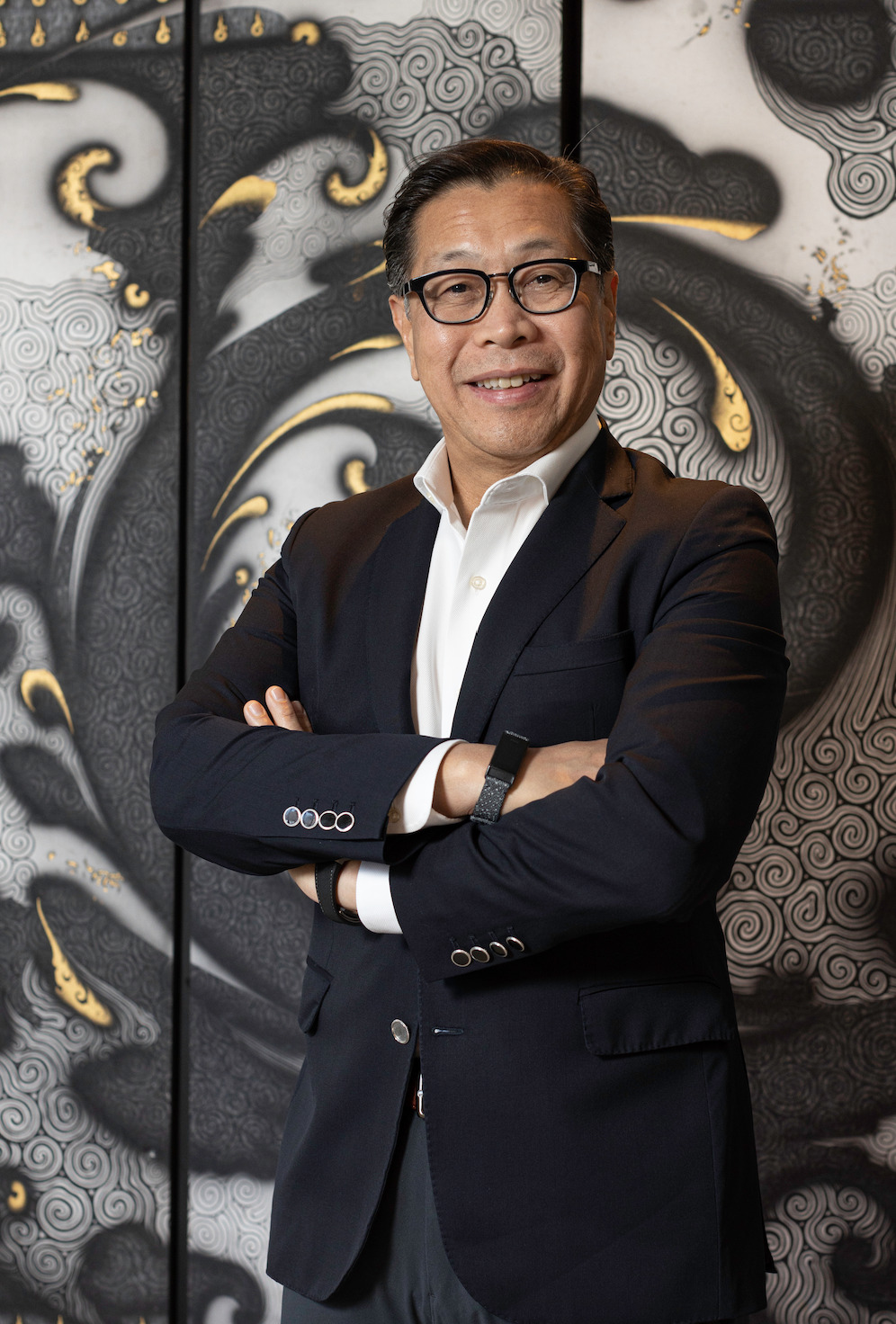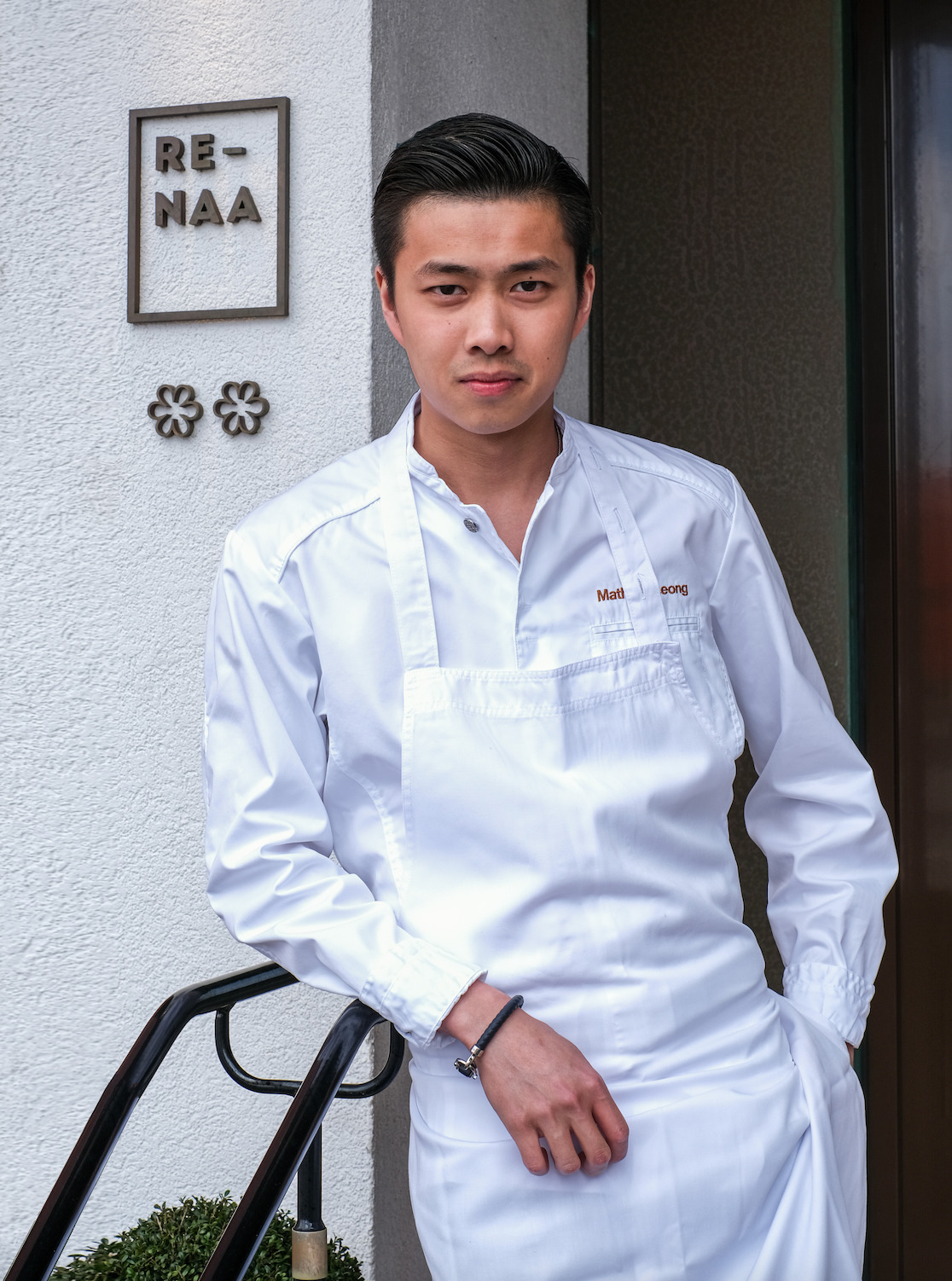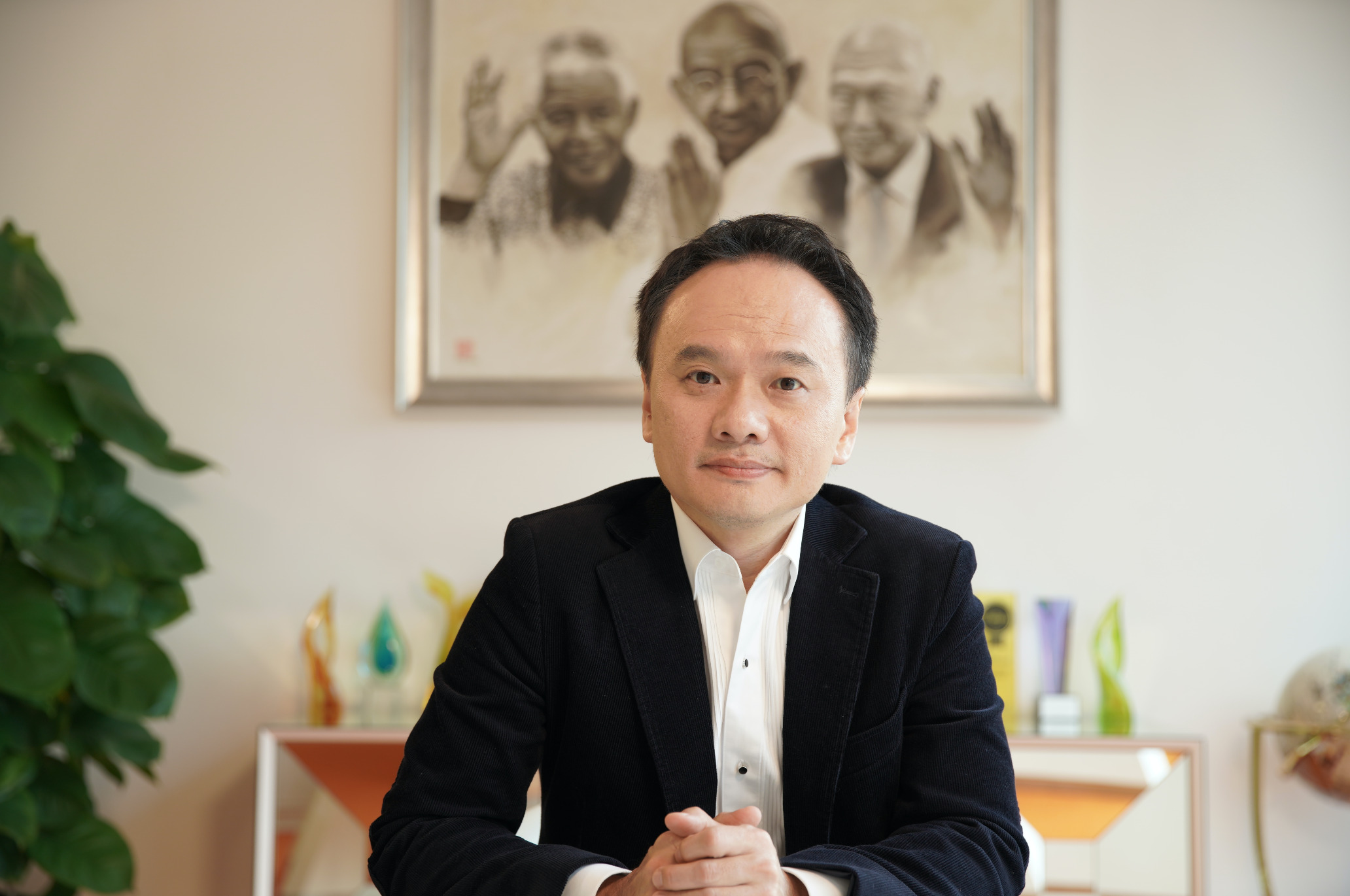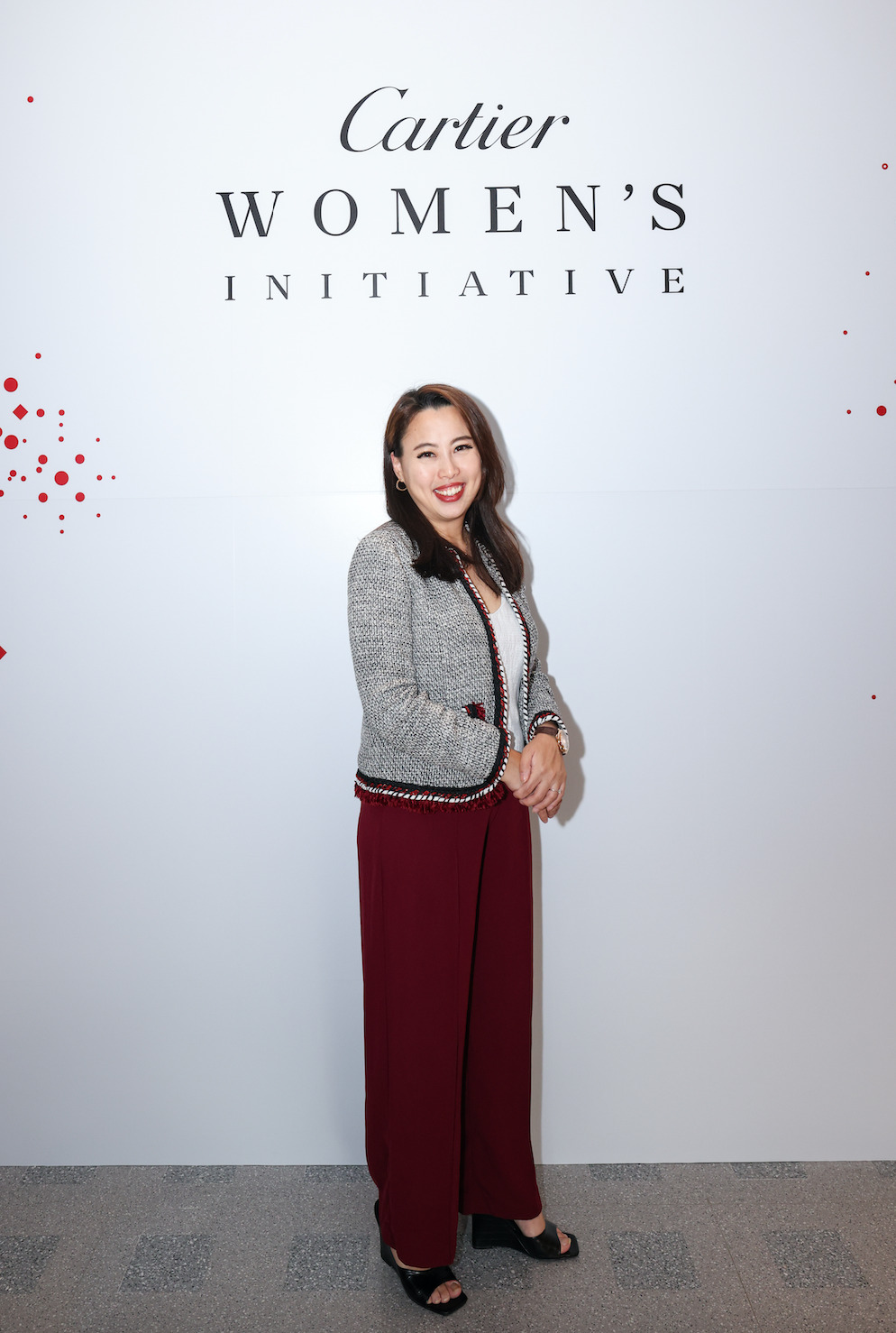PROFILE
Made in Singapore for the World
08 Aug 2023
In Singaporean writer Koh Buck Song’s book, “Brand Singapore”, which discusses how nation branding built up the city-state into a leading global city, it starts with: “Reputation is precious.” In this issue of Portfolio, we look at brands, companies, and individuals who are upholding Singapore’s reputation as an international player, and how they took their ideas and business from the little red dot to the world stage.
- EDDY SEE, PRESIDENT AND CHIEF EXECUTIVE OFFICER, BANYAN TREE HOLDINGS
- MATHEW LEONG, EXECUTIVE CHEF OF RE-NAA AND YOUNGEST SINGAPORE CANDIDATE FOR BOCUSE D’OR
- DAVID CHIEM, FOUNDER CEO AND CHAIRMAN, MINDCHAMPS HOLDINGS
- MINT LIM, FOUNDER, SCHOOL OF CONCEPTS AND SINGAPOREAN FELLOW OF THE CARTIER WOMEN’S INITIATIVE
The Banyan Tree Group has established itself as a leading brand in hospitality, having opened luxury hotels, resorts, and spas in numerous destinations around the world – from neighboring Malaysia and Indonesia to more faraway destinations like Mexico and Mozambique. How did this homegrown Singaporean company transform itself into a global player in just under three decades? Eddy See, President and Chief Executive Officer, Banyan Tree Holdings, tells us more.



In the competitive world of hospitality, what sets Banyan Tree apart from its competitors? What kind of expectations do you have to ensure quality and consistency in the properties in Asia and elsewhere in the world?
At Banyan Tree Group, we pride ourselves on offering a unique and immersive experience to our guests. What sets us apart is our commitment to sustainability and the preservation of local cultures and environments. Our philosophy of "Embracing the Environment, Empowering People" is deeply embedded in everything we do.
As the President and CEO, my expectations revolve around maintaining the highest standards of quality and consistency across all our properties globally. We have a rigorous selection process for our locations, ensuring that they align with our values and provide exceptional experiences. Additionally, we have a strong focus on training and development to empower our employees to deliver the Banyan Tree experience consistently.
As a company founded in Singapore, do you think that Banyan Tree possesses unique Singaporean qualities that allow it to stand out?
Absolutely. Singapore is known for its multiculturalism, innovation, and attention to detail. These qualities have influenced our group’s DNA and are reflected in our commitment to creating culturally immersive experiences and delivering personalized service to our guests. Singapore's emphasis on sustainability and green initiatives has also shaped our approach. We integrate sustainable practices into our operations, ensuring that we minimize our environmental footprint and contribute positively to the communities where we operate.
Can you give us an overview of what Banyan Tree has in the pipeline in the next few years? Of the numerous openings in countries like China, Japan, Taiwan, Spain, and more, what are you personally excited for and why?
We recently achieved our 70th property milestone and have a lot of exciting openings in the pipeline. Over the past two years, we have experienced rapid development in Japan, with four hotels already opened. We are thrilled to continue this growth with the upcoming opening of the first Banyan Tree in Kyoto next year, as well as the highly anticipated Cassia ski resort, expected to welcome guests by 2025.
Next year, we're opening Banyan Tree Veya in Baja California, Mexico, offering a captivating experience near the US border. We're also bringing Banyan Tree Escape to Lampung, Indonesia, within the next two years, providing a tranquil retreat on Sumatra Island. Angsana will debut in Spain in 2026. While Garrya is expanding with new properties in Indonesia, Vietnam, and China by 2025, showcasing diverse cultural experiences.
I'm personally excited for all these openings as they allow us to create exceptional experiences while preserving sustainability and local traditions. It's a testament to our continuous growth and global presence.
For local companies that have their eyes set on being the next big Singapore Brand with an international presence, do you have any words of advice? What kind of goals should they be working towards?
For aspiring local companies, my advice would be to focus on authenticity and differentiation. Identify your unique strengths and leverage them to create a brand that stands out in the international market. Stay true to your roots and showcase the best of Singapore's qualities.
It's also crucial to prioritise sustainability and social responsibility. Today's consumers value companies that are committed to making a positive impact on the environment and society. Incorporating sustainable practices into your business model and actively engaging in community initiatives will help you build a strong and respected brand.
- EDDY SEE, PRESIDENT AND CHIEF EXECUTIVE OFFICER, BANYAN TREE HOLDINGS
- MATHEW LEONG, EXECUTIVE CHEF OF RE-NAA AND YOUNGEST SINGAPORE CANDIDATE FOR BOCUSE D’OR
- DAVID CHIEM, FOUNDER CEO AND CHAIRMAN, MINDCHAMPS HOLDINGS
- MINT LIM, FOUNDER, SCHOOL OF CONCEPTS AND SINGAPOREAN FELLOW OF THE CARTIER WOMEN’S INITIATIVE
MATHEW LEONG, Executive Chef of RE-NAA and Youngest Singapore Candidate for Bocuse d’Or
Mathew Leong is the Executive Chef of RE-NAA, which is Norway’s only two-Michelin-starred restaurant in Stavanger, and Matbaren Bistro by RE-NAA. In addition to flying the Singapore flag proudly in Europe, Leong will once again be representing his country at the prestigious Bocuse d’Or championship in 2024/2025, which is considered to be the gastronomic equivalent of the Olympics. He will be competing at the continental qualifying event in 2024 to vie for one of the 24 spots at the finals, which will take place in Lyon, France in 2025.



As one of the more prominent Singaporean chefs making a name for themselves overseas, do you think certain aspects of your Singapore upbringing is responsible for the success you are enjoying now?
Definitely. I grew up with a strict father who would always tell me that I should do everything to the best of my ability. If not, I should not waste time doing it. The same goes for my career. The moment I decided to pack my bags and leave for Norway at 21, I told myself that no matter what it takes, I need to make a name for myself there. There is no point for me to move across continents if I don’t make use of the opportunity to do something great for myself and my career.
What Singaporean qualities/traits do you bring to the table at work and how has it helped you in your role as a chef in a Michelin-starred restaurant in Europe?
The ‘never give up’ attitude. When I first embarked on my career journey in Norway, I had only S$500. The first few months were incredibly tough. The cost of living in Norway is so high, with a McDonald’s meal costing an average of S$35.
I remember how I only had enough to afford plain bread for a few months, and there were even days I had to go on without any food. Given that I had arrived in Norway during winter, I remember using my first paycheck to get a winter coat from a second-hand shop because I didn’t pack any with me. While it was initially tough, I told myself that I came here for a purpose, and I need to persevere and not give up no matter how tough it was.
Just like my current role at RE-NAA where I work an average of 14 hours a day, I must continue to bite the bullet as there are greater things ahead that I’d like to achieve. I will not stop until I have reached my goal of opening my own Michelin-starred restaurant in Norway and Singapore.
All eyes will be on you as you represent Singapore at Bocuse d’Or in 2025. What kind of preparations are you making for this big international affair? What goals have you set for yourself to ensure that what you present is truly world class?
A new brigade of chef-mentors in Singapore have come together to form the Bocuse d’Or Singapore Academy to support my journey. The association is headed by its president, Bruno Menard, and comprises Michelin-starred chefs like Julien Royer, Sebastien Lepinoy, Kirk Westaway, and Emmanuel Stroobant, as well as veteran chefs like Eric Teo and Jimmy Chok.
Domstein, one of the largest leading fresh seafood suppliers in the Norwegian market, has committed close to €$300,000 (excluding equipment) to build a kitchen/training ground for me to train rigorously to compete in Bocuse d’Or 2024/2025.
The kitchen has been specifically designed to be the exact replica of Bocuse d’Or Grand Final competition hall in Lyon, France. That includes the size of the kitchen space, length and height of the table top, drawers and storage, as well as the position of kitchen equipment like the oven, stove, heating lamps, and sink.
By training in a kitchen that is the exact replica of the competition hall, it allows me and my commis chef to familiarize with our environment when cooking during the competition, to the point where I would know exactly how many steps are needed for me to reach from one point to another even with my eyes closed.
The brand of the oven is also deliberately chosen to be the same as the ovens provided at the competition hall. Training with the same equipment brand allows me to cook my food under the same condition and temperature during training and the competition, which is really important as it ensures the flavor of my food. As I am only given 5 hours and 35 minutes to prepare two dishes using the same seasonal products, being familiar with my kitchen space is vital as it would allow me and my commis chef to move around fast.
My ultimate goal is to make history by being the youngest, and also the first Asian/ Singaporean candidate to clinch gold. Since Bocuse d’Or started in 1987, the highest placing ever achieved by Asia at the final is bronze – Singapore in 1989 and Japan in 2013.
For young Singaporeans who have a goal of breaking into the international scene – whether it’s in F&B or other pursuits – what should they be focusing on to kickstart their dreams?
Work hard and stay driven always. This job is physically demanding with long and unpredictable working hours. In order to thrive while working in the kitchen, you need to be able to withstand hardships and ensure that you are physically and mentally strong.
I always believe that tough times don’t last, tough people do. The road during the start of the journey may be tough, with many hurdles and challenges to overcome along the way, but your perseverance and hard work will eventually pay off. My motto in life is that success will only come to those who work hard for it. It is also important that you create opportunities for yourself and not just wait for them to come. Be courageous to step out of your comfort zone because that’s how you will learn and grow.
- EDDY SEE, PRESIDENT AND CHIEF EXECUTIVE OFFICER, BANYAN TREE HOLDINGS
- MATHEW LEONG, EXECUTIVE CHEF OF RE-NAA AND YOUNGEST SINGAPORE CANDIDATE FOR BOCUSE D’OR
- DAVID CHIEM, FOUNDER CEO AND CHAIRMAN, MINDCHAMPS HOLDINGS
- MINT LIM, FOUNDER, SCHOOL OF CONCEPTS AND SINGAPOREAN FELLOW OF THE CARTIER WOMEN’S INITIATIVE
DAVID CHIEM, Founder CEO and Chairman, MindChamps Holdings
In Singapore, MindChamps enjoys the distinction of being a trusted name in early childhood and development education. But before establishing itself as a preschool of choice for discerning parents in Singapore, its journey started in Sydney as research centre, with a vision to fill the global gap in education based on solid, cutting-edge research, which will later be built into a global movement. David Chiem, Founder CEO and Chairman, MindChamps Holdings reveals, “Once we had the breakthrough education model in place, we wanted to prove our value in one of the world’s most rigorous education environments – Singapore.”



At what point in the MindChamps journey did you realize that it was time to take the school beyond Singapore and what challenges did you overcome along the way?
In the beginning it was difficult to get people to believe in us when we started with nothing but a powerful idea. In fact, many people had commented that it was like a “David versus Goliath” of an education system that was slow to change.
Through this, I truly learned the value of the Champion Mindset. As our Chancellor and Chair of Research, Emeritus Professor Allan Snyder, Fellow of the Royal Society (FRS), says, “In the best of times, the Champion Mindset is a valuable commodity.” And with that wisdom in mind, I was able to add, “in the worst of times the Champion Mindset is an absolute necessity.” The Champion Mindset enabled me to continue moving forward in the face of scepticism and fierce competition, overcoming the setbacks and challenges brought on by SARS in 2004, the Global Financial Crisis in 2008 and, most recently, the COVID-19 pandemic. Throughout it all I learned from my experiences, turning setbacks into set-ups, constantly adapting and where necessary, re-inventing to keep our business on track and growing, without losing the soul and DNA of MindChamps.
Since MindChamps was established in Singapore, do you think it possesses unique Singaporean qualities that allows it to differentiate itself from other preschools?
At MindChamps, our vision was to create an education movement that was revolutionary. Instead of focusing on the traditional approach to learning the way other educational organizations globally did, we focused on teaching the craft of learning and nurturing the mindset of passionate, lifelong learners. Over the last two and half decades, we have invested heavily in research and development, including appointing our own Global Research, Advisory and Programme Development Team led by our Chancellor, Emeritus Professor Allan Snyder to develop our proprietary, research-backed programs. No other early learning organization can claim this. As I mentioned, it was important for us to prove our revolutionary approach in Singapore, which not only has one of the world’s most demanding education environments, but is also a gateway where East meets West.
Our success here, achieving the number one position among premium range preschools, with a market share of 38.5 per cent and being ranked in Brand Finance’s top 100 Brands in Singapore in 2021 as the highest new entrent and the only preschool on the list, clearly demonstrates that we are unique in our category and ready for global expansion.
Unlike other early learning organizations, MindChamps has its own unique, research-backed curriculum and Intellectual Property, including proprietary reading programmes.
Walk us through some of the markets MindChamps has entered.
The first MindChamps International PreSchool was launched in the Philippines in 2015. Our presence there has now grown to six centers. We have three more MindChamps International PreSchools in Malaysia and Myanmar. In 2021, we expanded our international footprint with two new centers in Jakarta, Indonesia.
We now have 21 MindChamps Early Learning & PreSchool centers in New South Wales, with a pipeline of over 20 new franchise partners coming onboard throughout Australia. We have recently inked a Master Franchise License for 50 centers in Perth.
MindChamps is now registered in every major state in the US as a franchisor and has been approved by the US government under the SBA Scheme, enabling franchisees to take up to 80% loans backed by the government. With this in place, two franchisees have already secured their licenses with more in the pipeline.
For local companies/entrepreneurs who are looking to be the next big Singapore Brand with an international presence, do you have any words of advice? What kind of goals should they be working towards?
I’ve always believed that an entrepreneur’s duty is to fill in gaps in society not just locally, but globally. It is a given that we must have a clear vision, however visions are mere visions without a strong ‘engine’ behind it. And that engine and how strong that engine is depends on a few key elements.
The most critical element for going overseas is the element of culture because if the culture is not strong even on the home ground, it will be completely diluted by the time it reaches overseas. In order to sustain culture, it must be supported by the next element, which is a robust system to deliver the company’s promise. And for consistency of excellence, the third element of protocol must be clearly defined and understood by every team member.
As the business grows, it is vital to ensure that its core values and customer experience remain uncompromised. This requires establishing well-defined systems and protocols. In our case at MindChamps, our ChampionGold® Standard focuses on leadership quality, service standards, and our culture and relationships, helping us maintain consistency and high standards across all our locations globally.
Finally, in taking a brand global, I’m reminded by what my dear friend and our Chair of Research, the renowned neuroscientist, Emeritus Professor Allan Snyder (FRS) once said, “It is one thing having a great idea, but it is another getting it to the world.” And, over the last 25 years of building MindChamps, I now understand his profound wisdom and would add that it is yet another thing to be able to sustain that idea at a level of consistency and excellence.
- EDDY SEE, PRESIDENT AND CHIEF EXECUTIVE OFFICER, BANYAN TREE HOLDINGS
- MATHEW LEONG, EXECUTIVE CHEF OF RE-NAA AND YOUNGEST SINGAPORE CANDIDATE FOR BOCUSE D’OR
- DAVID CHIEM, FOUNDER CEO AND CHAIRMAN, MINDCHAMPS HOLDINGS
- MINT LIM, FOUNDER, SCHOOL OF CONCEPTS AND SINGAPOREAN FELLOW OF THE CARTIER WOMEN’S INITIATIVE
MINT LIM, Founder, School of Concepts and Singaporean fellow of the Cartier Women’s Initiative
Mint Lim, the founder of School of Concepts (SOC), is a dyslexic who found it challenging to learn English from a young age. She was fortunate enough to receive help from someone who taught her how to read and this kindness planted the desire in her to give back. She started SOC in 2018 with a simple mission: To give children access to quality education through the school’s literacy program. This year, she was recognized as the first Singaporean fellow of the Cartier Women’s Initiative, which brings together women impact entrepreneurs who are awarded a grant funding to support their businesses.



What unique challenges do people with dyslexia face in Singapore?
As an individual with dyslexia, I can share my personal perspective on the challenges I have faced and the growth I have experienced. Over time, there have been significant advancements in identifying and understanding dyslexia. It is no longer an invisible condition and is now more readily recognized. However, I hold the belief that the information regarding a dyslexia diagnosis should be shared selectively, with those who can effectively manage and navigate the information towards positive outcomes.
Personally, I often had to put in more effort than others to achieve the same results. This process has provided me with a deep understanding of what others might perceive as "failure". Rather than seeing these setbacks as obstacles, I view them as steppingstones towards reaching my aspirations.
It is important to recognize that the challenges faced by individuals with dyslexia in Singapore are not solely limited to personal experiences but encompass broader issues highlighting the urgent need to foster an inclusive environment that embraces diverse learning styles, promoting acceptance and empathy.
What does the distinction of being the first Singaporean fellow of the Cartier Women’s Initiative mean to you?
The recognition is a form of affirmation and gratitude. Affirmation that the work put together by the superhero leaders on my team alongside their teammates has brought SOC to where it is today. Grateful to be surrounded by kindred souls who’ve so generously contributed their time, commitment, and expertise, taking what started out as a child-like desire to a ready mission to gaining recognition in some parts of the world today.
I’m excited about bringing equity to education, where inclusive classrooms become a norm and every child is recognised and appreciated for his/her talent(s) – leaving no child behind.
How does it feel being a member of this international community of women entrepreneurs? How will this position, as well as the recognition and support from a global brand like Cartier, enable you to take School of Concepts further in the future?
Being a member of Cartier's Women Initiative international community of women entrepreneurs is an absolute privilege; one that fills me with deep gratitude and inspiration. It is an acknowledgment of the tireless efforts my team of passionate individuals have poured into SOC and a testament to the impact we have made in our community. The support and recognition from Cartier has left an indelible mark on our journey, opening up new horizons as SOC works towards scaling its impact regionally.
The international platform provided by Cartier's Women Initiative community has allowed us to forge connections, collaborate, and learn from extraordinary women entrepreneurs who are blazing trails in their respective fields. The opportunity to exchange ideas, experiences, and insights with this remarkable community has inspired me greatly.
With Cartier's recognition, our visibility has soared to new heights. Our mission and work, once confined to our local community, has arrived at a global stage. The newfound exposure has empowered us to touch the lives of more children, attract potential partners, and garner the support of like-minded individuals and corporates who share our vision that one day no child will get left behind.
What advice do you have for entrepreneurs in Singapore who are looking to take their passion and message beyond the little red dot?
Fall in love with what you do, love deeply enough to draw courage to push the boundaries of your comfort zone, and embrace bigger dreams.
By nurturing a profound love for your mission, your passion will become infectious, attracting like-minded individuals from across the region and even the globe. Together, opportunities to embark on a collective journey will come about, creating positive changes with ripple effects.
Let your love for the good work you do be a beacon of inspiration. It will empower you to embrace every opportunity to expand your reach and draw together communities locally and abroad who will become catalysts to further the impact.











 Back
Back
